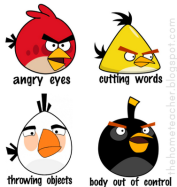Sometimes our expectations create difficulties when others let us down or our goals are not achieved. In our anger and disappointment there are several ways to react at those times. Sometimes our expectations are rational and reasonable. At other times, when we closely examine them, our expectations have been irrational and need to be adjusted to fit reality.
The comedian Flip Wilson’s character, Geraldine, from the 1970’s and 1980’s used to decry that “The devil made me do it” to explain why she made certain choices. Part of what made the character so funny was that, at one time or another, we all use projection and blame to explain why we feel certain ways, to justify our behavior or to absolve ourselves from responsibility.
This approach to seeing the world is fraught with difficulties that can seriously impact relationships. When we believe people ‘should’ act in certain ways we betray our own perspectives about how things should be without giving adequate attention to reality; i.e., the way things are. This can create problems when people do not act or say things the way you or I think that they should act or say them.
Albert Ellis, the father or Rational Emotive Behavior Therapy, was influenced by the tradition of ancient Stoicism. In this philosophy reason and logic are the governing principles that guide the thoughts and feelings of the person who would be wise. The first-century philosopher Epictetus is one example of Stoicism that reaffirms many of the concepts that underlie this approach to problem solving. I love his tongue-in-cheek approach to this topic.
IRRATIONAL IDEA NO. 1: “I must do well and win the approval of others for my performances or else I will rate as a rotton person” (p. 39). This philosophy goes a long way to perfecting the art of perfectionism!
IRRATIONAL IDEA NO. 2: “Others must treat me considerately and kindly and in precisely the way I want them to treat me. If they don’t, society and the universe should severely blame, damn and punish them for their inconsideration” (p. 41).
IRRATIONAL IDEA NO. 3: “The world (and the people in it) must arrange conditions under which I live so that I get everything that I want when I want it. And further, conditions must exist so that I don’t get what I don’t want. Moreover, I usually must get what I want quickly and easily” (p. 42).
The sub-points of each of these “Irrational Ideas” step on a few nerves in Ellis’ book, Anger: How to Live With and Without It but if you keep wondering why others make you angry or why you are not able to get things done because of the actions of others, this could be a helpful read.


